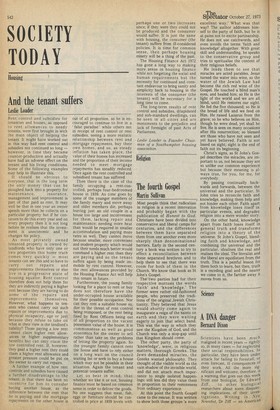Housing
And the tenant suffers
Leslie Loader
Rent control and subsidies for tenancies and houses, as opposed to rent allowances to needy tenants, were first brought in with the main object of helping the tenant. It might have worked out in this way had rent control and subsidies not continued so long — however, in time they became counter-productive and actually have had an adverse effect on the tenant and his living conditions. Some of the following examples may help to illustrate this.
It should be obvious to everyone, that in the long term the only money that can be ploughed back into a property for maintenance, insurance, management And improvement is part of that paid as rent. It may well be that in one year an owner spends more than he collects on a particular property but if he continues to do this every year and on every property then it is not long before he realises that the investment is uneconomic and he changes his policy.
As most privately owned tenanted property is owned by landlords who have only one or two properties this home truth comes very quickly — most tenants can see this and so have to carry out repairs and improvements themselves or else live in a progressive state of housing squalor. Rent control therefore does not help them for they are indirectly paying a higher rent because they are having to do some of the repairs and improvements themselves. However, what happens to tenants who cannot carry out such repairs or improvements due to physical incapacity, age or just because they refuse to take on what in their view is the landlord's liability? Those paying a low rent cannot claim higher rent allowances or higher supplementary benefits but can only claim the low controlled rent. If, however, they paid a higher rent they could claim a higher rent allowance and greater pressure could be put on the owner to carry out repairs.
A further example of, how rent controls and subsidies have caused a further disadvantage to the tenant, is that there has been no incentive for him to consider buying another house, as the difference between the rent that he is paying and the mortgage repayments on the other, house is out of all proportion, so he is encouraged to continue to live in a 'false paradise' while others not in receipt of rent control or rent subsidies, seeing a more realistic relationship between rent and mortgage repayments, buy their own homes, and so, as steady
inflation has taken place, the value of their homes has increased and the proportion of their income needed to meet mortgage. repayments has steadily reduced: Once again the rent controlled and subsidised tenant has suffered.
Then there is the case of the family occupying a rent-con trolled, perhaps four-bedroomed house in 1939. As time goes by some of the younger members of the family marry and move away and older members die, perhaps leaving just an old couple in a house too large and inconvenient for them, lacking 'repair and maintenance; needing more heat than would be required in smaller accommodation and paying more rates as well. They cannot move because smaller, more convenient and modern property which would suit their needs much better would command a higher rent than they are paying and so the tenant suffers again by being made immobile by rent control. However, the rent allowances provided by the Housing Finance Act will help this tenant in future.
Furthermore, the young family looking for a place to rent or buy does not therefore have the under-occupied house available for their possible occupation. Nor can they rent a suitable house as, due to the threat of rent control being reimposed, or the rent being fixed by Rent Officers being out of all proportion to the vacant possession value of the house, it is commonsense as well as good economics for the owner to sell rather than take on the problems of letting the property again. So the younger family cannot rent the house and have to rely either on a long wait on the council waiting list or seek to buy a house which may not be possible in their situation. Again the tenant and potential tenants suffer.
Let us bear in mind, that whether we like it or not, housing finance must be based on common sense in order to deliver the goods. No one suggests that meat, fish, eggs or furniture should be controlled in price at 1939 levels with perhaps one or two increases since; if they were they could not be produced and the consumer would suffer. It is just the same with housing, the consumer (the tenant) suffers from ill-considered policies. It is time for common sense, then perhaps housing misery will be a thing of the past.
The Housing Finance Act 1972 has gone a long way to making more sense in housing finance while not forgetting the social and human requirements but the necessity for continued and constant endeavour to bring sanity and simplicity back to housing in the interests of the consumer (the tenant) will be necessary for a long time to come, The long-term results of rent control and subsidies, dilapidated and sub-standard dwellings, can be seen in all cities and are monuments to the prejudice and ,lack of foresight of past Acts of Parliament.
Leslie Loader is Founder Chairmanof a Southampton housing association.


































 Previous page
Previous page